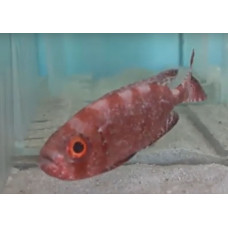Latin name
Belonoperca chabanaudi
Other name
Arrow-head soapfish, arrow-headed soapfish, chabanaud's soapfish.
Identification
Arrowhead soapfish have a massive body and a large mouth. Their gill covers are covered with spines.
Features of fish fins
Dorsal spines (total): 9; Dorsal soft rays (total): 10; Anal spines: 2; Anal soft rays: 8.
Fish colouring
The body of these fish is brown (can be dark bluish-grey to almost black) with a saddle-shaped yellow spot on the tail. There is a large black eye-shaped spot on the dorsal part of the back.
Distribution
Widespread in the Indo-Pacific region: East Africa to Samoa, north to the Ryukyu Islands, south to New Caledonia.
Habitat
A marine tropical species associated with reefs. Depths from 4 to 50 metres. Occurs on steep slopes in coral rich areas.
Size
The maximum length of this species is 15 cm.
Behavior
Arrowhead soapfish usually live on the surface of the water in burrows. They are nocturnal. Very secretive and solitary. When stressed or threatened, they can secrete toxic mucus from their skin.
Food and feeding habits
They feed on small fish and crustaceans.
Reproduction
Hermaphrodites, although the gonads of both sexes do not usually develop at the same time.
Fishing
No commercial interest in fishing.
Relationship with a person
Harmless.
| Classification | |
| Phylum | Chordata |
| Class | Actinopterygii |
| Squad | Perciformes |
| Family | Serranidae |
| Genus | Belonoperca |
| Species | B. chabanaudi |
| Features | |
| Conservation status | Least Concern |
| Habitat | Pelagic |
| Life span, years | No information |
| Maximum body weight, kg | No information |
| Maximum length, cm | 15 |
| Sailing speed, m/s | No information |
| Threat to people | Not edible |
| Way of eating | Predator |
Arrowhead soapfish
Tags: arrowhead soapfish

